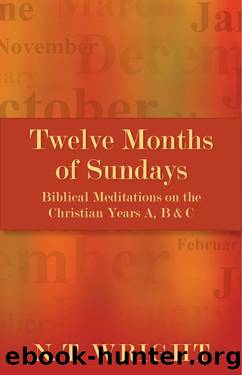Twelve Months of Sundays by Tom Wright

Author:Tom Wright
Language: eng
Format: epub
Publisher: Morehouse Publishing
Published: 2012-12-15T00:00:00+00:00
Day of Pentecost
Acts 2.1â21
Romans 8.22â27
John 15.26â27; 16.4bâ15
It is one of the striking features of the New Testament that Luke, Paul and John, so very different as writers and theologians, sing in rich harmony when it comes to the Spirit.
At the heart of the music is the sense of uncontainable newness. The sneering reaction on the day of Pentecost wasnât too silly: in a sense the disciples were filled with new wine, and the old wineskins were showing signs of splitting. Or, in Pauline language, the groaning of all creation was now located within the believers themselves, so that the tension between the old world and the new had become an inner tension within the Christian, longing for the resurrection body which would give appropriate physical expression to the astonishing new energy welling up within.
Or, in Johannine language, the Spirit demonstrates, in a quasi-judicial fashion (it isnât only Paul who uses legal metaphors), that the world is in the wrong. Itâs in the wrong in its modes of morality (the cardinal sin is not believing in Jesus); in its notion of justice (the worldâs justice sent Jesus to the cross, but Godâs justice uses that as the means of Jesusâ glorification); and in its eager judgement (it condemned Jesus, but actually his death was the condemnation of âthe ruler of this worldâ). The Spirit makes Godâs people sing out of tune with the rebellious and decaying world. Pentecost is, after all, the festival of the giving of the Law on Sinai, 50 days after the Exodus, marking out Israel as Godâs peculiar people.
But just when we might think that the Spirit was taking us out of the world altogether, making us a cult of flaky fanatics, the same writers make it clear that the Spirit is the agent of creationâs renewal and redemption. This is the same Spirit that brooded over creation, that spoke through the prophets. John has Jesus breathe the Spirit into the disciples precisely at the resurrection, the moment when the old world is brought to new life after death. Paul envisages the whole created order as a woman going into the pains of labour, longing for the child to be born in which her destiny as a mother will be fulfilled. Luke, through Peterâs fresh reading of Joel, indicates that this new experience will bring about the reconciliation of young and old, slave and free, male and female, heaven and earth.
Too idealistic? Donât settle for less than the ideal vision. But expect, in embracing it, to be called to groan in prayer. It isnât only the individual Christian, but the whole community, that needs the Spiritâs help in our weakness. Precisely when we are confronted again, in our communities as well as in our selves, with the pains and problems of our continued unredeemed existence â that is the time when the Christ-shaped dialogue of Spirit and Father, which is what Christian prayer is all about, can flourish. The harmony of Pentecost depends on precisely this paradox.
Download
This site does not store any files on its server. We only index and link to content provided by other sites. Please contact the content providers to delete copyright contents if any and email us, we'll remove relevant links or contents immediately.
The Five People You Meet in Heaven by Mitch Albom(3547)
The Secret Power of Speaking God's Word by Joyce Meyer(3148)
Real Sex by Lauren F. Winner(3000)
Name Book, The: Over 10,000 Names--Their Meanings, Origins, and Spiritual Significance by Astoria Dorothy(2966)
The Holy Spirit by Billy Graham(2933)
0041152001443424520 .pdf by Unknown(2838)
How The Mind Works by Steven Pinker(2808)
ESV Study Bible by Crossway(2768)
Ancient Worlds by Michael Scott(2663)
Churchill by Paul Johnson(2570)
The Meaning of the Library by unknow(2555)
The ESV Study Bible by Crossway Bibles(2543)
The Gnostic Gospels by Pagels Elaine(2515)
MOSES THE EGYPTIAN by Jan Assmann(2408)
Jesus by Paul Johnson(2347)
City of Stairs by Robert Jackson Bennett(2337)
The Complete Dead Sea Scrolls in English (7th Edition) (Penguin Classics) by Geza Vermes(2269)
The Nativity by Geza Vermes(2219)
Ancient Near Eastern Thought and the Old Testament by John H. Walton(2213)
